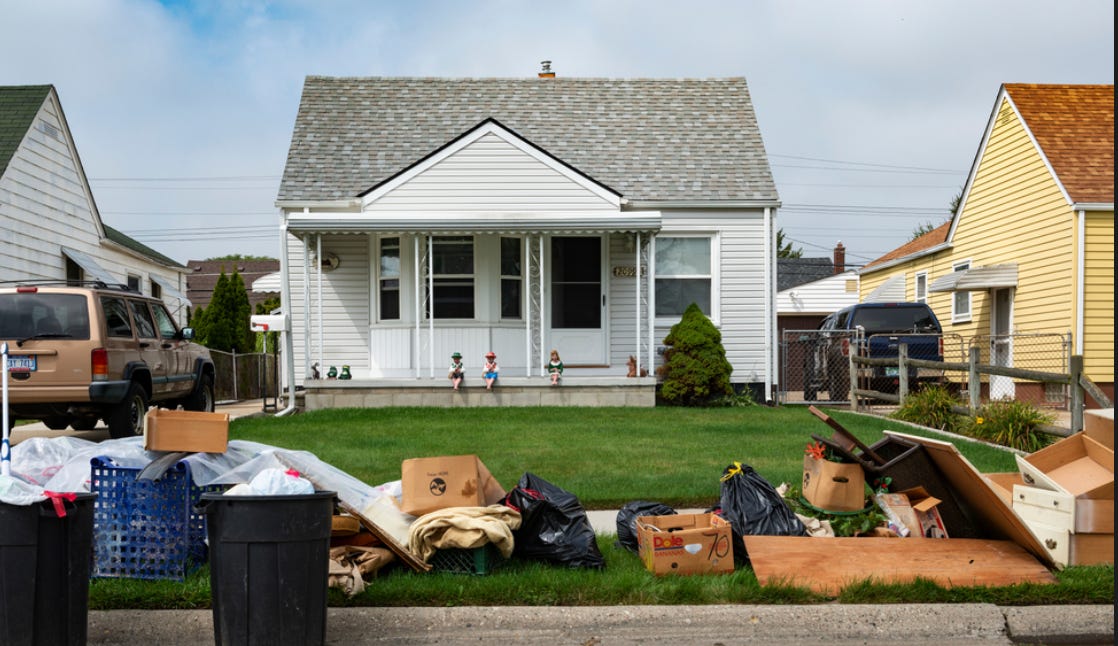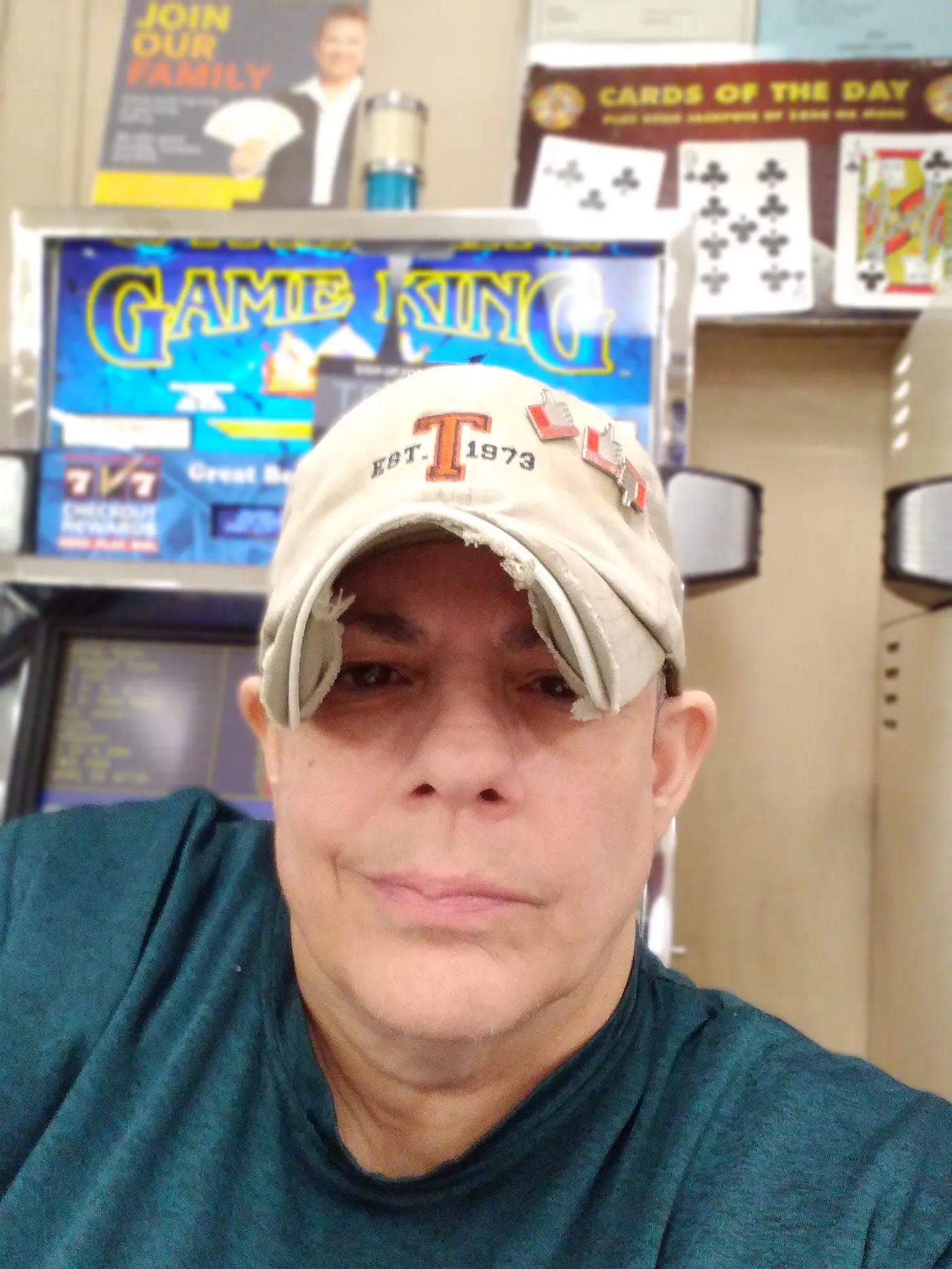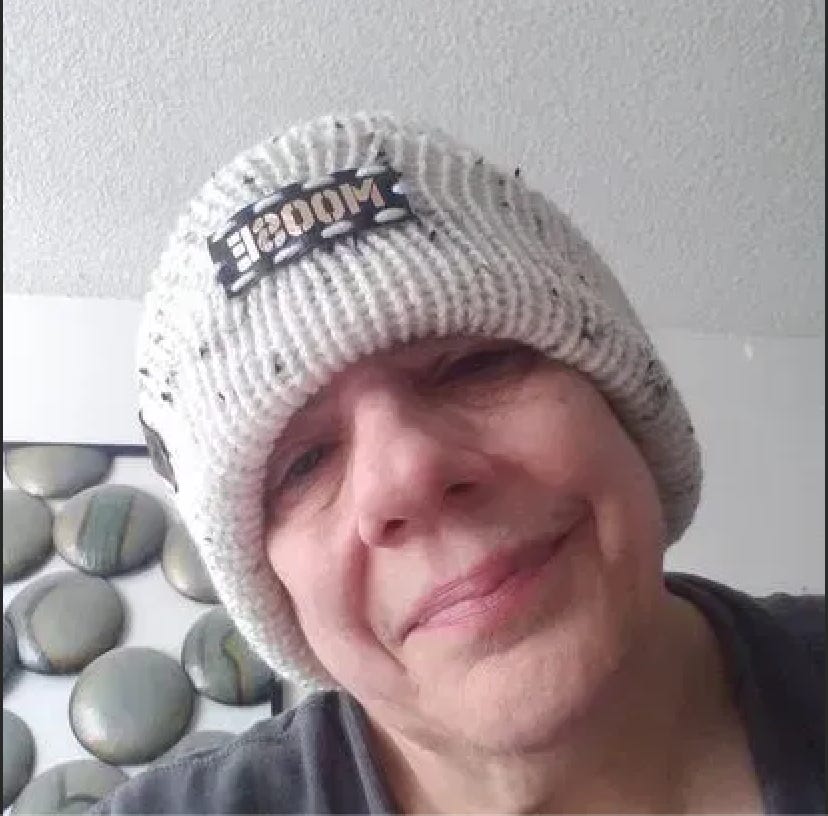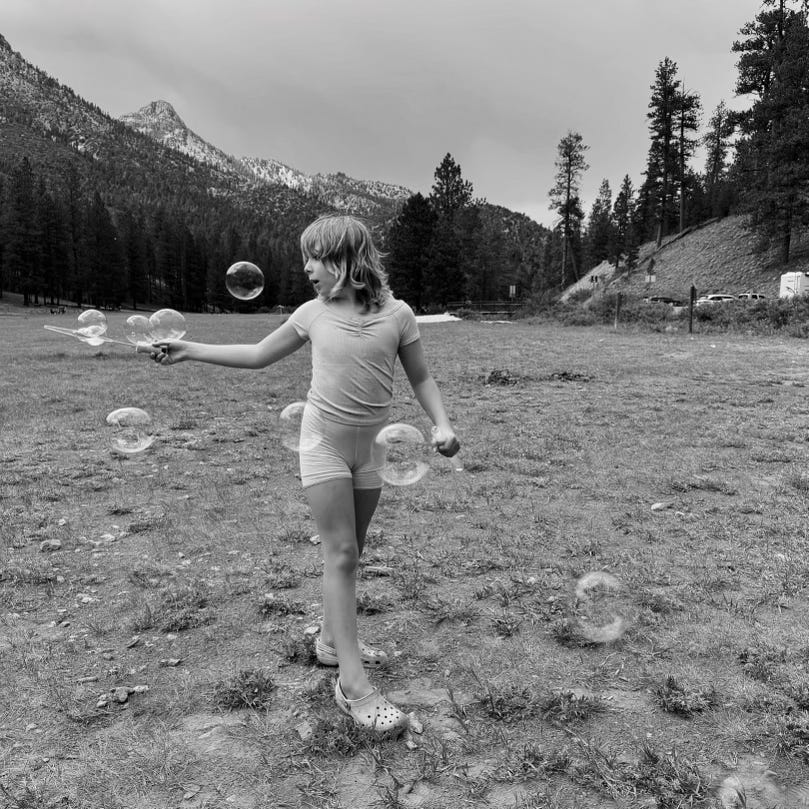The Violence of Eviction.
An update on Johnnie + the ways in which eviction creates more poverty.
People have been asking about Johnnie lately - thank you for that! I love that people are out there thinking about her and worrying for her - I have been putting off updating you all until I had some definitive news.
If you are new here and wondering who Johnnie is, I’ve written about her quite a bit. She is one of the folks I wrote about in The Meth Lunches and I also talked about her in my UNLV Forum Lecture on poverty and hunger. At 62, Johnnie is still living with the implications of severe childhood hunger. She is also an important part of my community here in Vegas.
How we got here.
Johnnie got behind on her rent, after 12 years of on-time payments to her apartment’s property manager, she was evicted the first month she got behind. But this isn’t simply a story of getting behind, it’s also how she got behind.
I wrote this about her situation:
Johnnie has been with Kroger for 17 years. She makes a solid hourly of $22.56 which matches the length of time she has worked. It’s a solid hourly wage. But she is only getting about 24 hours a week. And second jobs are hampered by having to be available on short notice when a colleague is out sick. This lowers her options. She doesn’t get paid for being on call. If she leaves, she loses her hourly and her seniority. She is stuck.
So, this puts Johnnie, after taxes, at $473/week or $1892/month. Her rent before eviction was in the $1300-ish area giving her a few hundred for food, utilities, cell, car / gas and repair, therapist/medical, meds, pet care and incidentals. She does not have health insurance - she is putting off major health maintenance until she is 65 and eligible for medicare. She doesn not have money going into a 401K for retirement. That has not been offered to her.
Kroger’s bait (Come make good money with us!) and switch (We aren’t going to give you enough hours!) is unequivocably the reason she fell behind on rent.
On being an employee of Kroger.
As I previously wrote, we know that this is not an anomaly for kroger workers. According to the NY Times and The Economic Roundtable, a nonprofit research group, 75% of 10,000 Kroger employees interviewed, met the definition of food insecure. 14% of these 10,000 employees were either homeless, in a precarious housing situation, or had been homeless in the last year. 63% said they did not make enough to cover basic expenses on a monthly basis.
75% of Kroger employees surveyed are…HUNGRY. They go to food pantries, and go without, and scrape to get dinner on the table, and beg for more hours to work. This problem is not a Johnnie problem. It’s a Kroger problem.
Another issue for Johnnie is that because of her early childhood trauma and starvation, she can’t go off and work just anywhere. After the GoFundMe, a friend of mine offered Johnnie some hourly work setting up for conventions. I told Johnnie, but I knew it was outside of her abilities. Not the work itself, just the debilitating anxiety she lives with in new situations, unexplored routines, new relationships, managing how to be around food, she has to be in control, have things a certain way, do things in structured routine. Anything deviating from this can send her into panic. Her job opportunities are limited.
Johnnie is, in may ways, disabled by her early life trauma and in a constant war with her mental health. She thinks about suicide daily, hourly, even under regular circumstances, she is always managing her own sense of not deserving to be cared for, or loved, or lucky or deserving of good things. The only thing that keeps her with us is her beloved cats. She can’t leave them.
Her devotion, and promises to them, cleave her to the world.
Yesterday, I got to see Johnnie.
That’s why this newsletter is a day late. She and I wanted you to know.
“I put the money from the GoFundMe in a separate account,” she tells me, as if I might be wondering about the money (I am not). It is hers now and how she spends it is for her to decide. But she wants me (and those of you who contributed) to know she will use it wisely. That matters to her.
What you get by talking to Johnnie is just how traumatizing this experience has been for her. This eviction and everything she has gone through has changed her. It is not a singular life event that you have and then recover from it and move on. Instead, it lingers. It creates a vulnerability that cannot be fully healed.
“I have always taken care of myself,” she says.
“I’m such a failure.”
Johnnie has been really good at setting herself up for stability after a lifetime of childhood insecurity. She kept her life small, herself small, to keep everything working. This eviction jolted her. It made a lasting, perhaps lifelong, impact on her feelings of security. This experience is not an anomaly.
What we know from research done on eviction is that being evicted isn’t just a symptom of poverty. It is also creates and maintains poverty. As Matthew Desmond writes about a specific Rice University study that tracks single mothers in poverty who experienced an eviction:
In some instances, eviction may not simply drop poor mothers and their children into a dark valley, a trying yet relatively short section along life’s journey; it may fundamentally redirect their way, casting them onto a different, and much more difficult, path.
Desmond and his team found that these evicted mothers experienced more depression years after losing their homes, showing that eviction has long-term phsychologcal side effects on people’s sense of well-being and security.
This is clearly happening to Johnnie. Even with her bank account full of Go Fund Me money, she has been unable to find a legitimate apartment complex to rent to her because of the eviction. She cannot find a private owner who will rent to her once they discover the eviction. And she has almost secured an RV a couple times, but each one has fallen through for different logistical reasons like, needing a truck to park it someplace, etc.
Had she not landed at her friend, Kim’s house, who has given her all the time she needs to get back on her feet, she would be trying to make these connections from a shelter bed, or on the street, or in hotels. And this is how people get stuck in these poverty circumstances where they cannot right themselves.
Today, we went to see an apartment that I have been trying to get her to look at since the eviction happened. The complex is called Hebron and it provides apartments and support to folks who are unhoused or insecurely housed, and are looking for permanancy. They do not care or even check for evictions. There has been a $900 studio there for months.
It felt to me like a way for Johnnie to start over.
But something has always stopped her. And it’s powerful. She sees herself as independent, able to take care of herself, not needing help, and the idea of going into this apartment complex with people who struggle more than she does, feels like going under, drowning, becoming less than she was before.
But this week, after a particularly defeating week looking for places, she called and asked me to bring her there to check it out. I picked her up. The panic began as soon as I pulled into the Hebron parking lot on Las Vegas Boulevard. She noticed a few unhoused and meth-addicted folks in the area as we got there.
“I don’t feel safe. I don’t feel safe,” she said. Her panic was visible.
“I can’t go in.”
I put the car in reverse and drove out.
“I’m sorry, Kim. I love you, but I can’t. I don’t feel safe.”
Hebron has 24 hour security, staff in house all the time and offers a free grocery pantry, community dinners and events. It’s not a scary place, but for Johnnie all of this threatened her sense of independence.
For a long time after, we sat in the car in the Smith’s parking lot, air conditioning running. We talked and Johnnie cried. She can’t allow herself to go beneath what she had before. I get it. I so get it. No one wants to go backward. No one wants to feel like they are going backward. Poverty is about this feeling.
“I’m sorry, don’t be mad at me, Kim.”
I could never be mad at her. This stuff is so hard. Poverty is not just about money in, money out. It’s about how you feel. How you see yourself. It is not just about having a place to live. It’s more about having choices and room to maneuver and room to be yourself. To feel like you have some autonomy over your own life. To have options and not be forced into accepting situations that make you uncomfortable. Poverty is being hemmed in.
We talked about all the friends she has. Kim, who wants her to stay as long as she wants, me and our family who will always be there for her, all of you who contributed to her GFM, her friends at the store, how she has her job, a roof, a safe place for the cats, and that those things are in place because she created that. She brought all these people and all these good things into her life.
She made this safety net happen for herself. She is okay, stable, not falling, not drowning, because of how she took care of herself and set herself up. She is okay.
Johnnie and I will be able to give you all a celebratory update. She has planned it out, a video, smiles, a tour of her new digs, new beginnings. It’s going to happen. Just not today.
__________________
END NOTES:
This is a day late, but Johnnie and I wanted to update you and it took me a minute. Thank you for rooting for her and sending good vibes her way.
Hope you all are keeping cool. This photo is from a quick day trip to the mountains of a picnic. We sure needed to get out of the heat.
Thank you, as always, for reading. xo Kim








Thank you for the update on Johnnie! TG for helping and for those cats. ❤️
Thank you for sharing your difficult journey with us Johnnie - thinking out loud, is there a tenants board or or union in Vegas that can help get the eviction removed from her record?